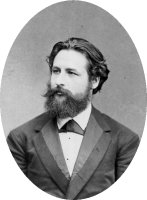Heinrich Hofmann
(13 January 1842, Berlin -- 16 July 1902, Groß-Tabarz, present-day Thuringia)
German composer and pianist
Octet in F-major, Op.80 (1883)
For string quartet, flute, clarinet, french horn, and bassoon.
Ensemble: John Wion, flute & Bronx Arts Ensemble
Mov.I: Allegro molto 00:00
Mov.II: Andante sostenuto 06:23
Mov.III: Gavotte 13:12
Mov.IV: Allegro vivo 17:14
The Octet, op. 80, is scored for string quartet with flute, clarinet, horn, and bassoon. It is the only
piece in the repertoire written for this combination, and it can be assumed to have been a commission.
If Hofmann looked backwards for his musical language and inspiration, it is not too surprising that
the Octet proposal directed him towards Mendelssohn's work for double string quartet.
Quite without shame he opens his work with a motif almost identical to Mendelssohn's.
Marked Allegro molto this wonderfully happy theme is stated first by the violin and then by the flute. The tonality moves from F to A-flat for the more romantic second theme played by the clarinet.
A third, more martial, theme ends the statement. The development bubbles along into the restatement, and a short but exhilarating coda ends the movement.
The rhapsodic second movement, Andante sostenuto, is a nocturne, the mood set by the beautiful horn opening. The fantasy is of silvery moonlight, heavy, perfumed air, and romantic dreams-no nightmares or hobgoblins here!
The Gavotte is an absolute charmer - the stuff of encores - and the finale, Allegro vivo, sparkles like champagne with a dash of melodramatic fun thrown in for good measure.
----------------------------------------------------------------------------
Heinrich Karl Johann Hofmann (13 January 1842, Berlin – 16 July 1902, Groß-Tabarz, present-day Thuringia) was a German composer and pianist. He was a pupil of Theodor Kullak, Eduard Grell, Siegfried Dehn and Richard Wüerst. His Frithjof Symphony (1874), a musical realization of the legend Friðþjófs saga hins frœkna, was one of the most frequently performed orchestral works in Germany during the late 19th century. In addition to orchestral music, he also wrote several operas, some lieder, choral music, and works for solo piano. After his death, his music fell largely into obscurity.[2015. 8. 20 1차]
'♣ 음악 감상실 ♣ > - 8중주(OCTET)' 카테고리의 다른 글
| [☆5]George Stephănescu : Octet in G major for strings and wind instruments (1866) (0) | 2021.06.10 |
|---|---|
| Ignaz Josef Pleyel- Octet in B flat major (0) | 2018.12.12 |
| Felix Weingartner- Octet, op 73 in G major (0) | 2018.11.22 |
| Louis Théodore Gouvy - Ottetto, Op.71 (1879) (0) | 2016.08.16 |
| Carl Reinecke - Wind Octet in B♭ - Op. 216 (0) | 2016.08.15 |
